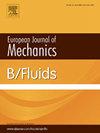非理想流体下旋转管流的线性稳定性
IF 2.5
3区 工程技术
Q2 MECHANICS
引用次数: 0
摘要
对含非理想流体的旋转管流进行了线性稳定性分析。研究的重点是超临界CO2,其汽液临界点附近,热力学性质明显偏离理想气体。考虑不同的壁温,确保中心线温度跨越亚临界、跨临界和超临界条件。模态分析表明,在低转速下,不稳定模态只存在于转速Ω<;此外,还出现了多种不稳定模式,与非旋转管道流动相比,引入了更复杂的不稳定机制。随着转速的增加,粘滞耗散在稳定流动中起着关键作用,而热力学效应则是次要的。非模态分析进一步表明,在固定频率强迫下,系统的最优响应由于旋转而发生位移,在高压缩率下与不可压缩行为的偏差更大。在旋转管道流动中,瞬态能量增长对方位角波数(n)的依赖本质上是非线性的,这与在非旋转管道流动中通常观察到的近似线性关系形成鲜明对比。这种非线性主要是由于旋转引入的方位速度分量的影响而产生的。这些发现突出了旋转、可压缩性和热力学之间的复杂耦合,为非理想流体系统的不稳定性机制提供了新的见解。本文章由计算机程序翻译,如有差异,请以英文原文为准。
Linear stability of rotating pipe flow with non-ideal fluid
A linear stability analysis is performed on rotating pipe flow with a non-ideal fluid. The study focuses on supercritical CO near its vapor–liquid critical point, where thermodynamic properties deviate significantly from ideal gas. Different wall temperatures are considered, ensuring centerline temperatures span subcritical, transcritical, and supercritical conditions. The modal analysis reveals that at low rotation speeds, unstable mode only exists at rotational speed . Also multiple unstable modes emerge, introducing a more complex instability mechanism compared to non-rotating pipe flow. As rotation speed increases, viscous dissipation plays a key role in flow stabilization, while thermodynamic effects remain secondary. The non-modal analysis further demonstrates that optimal system response under fixed-frequency forcing shifts due to rotation, with stronger deviations from incompressible behavior at high compressibility. In rotating pipe flow, the dependence of transient energy growth on the azimuthal wavenumber () is inherently nonlinear, which stands in stark contrast to the approximately linear relationship typically observed in non-rotating pipe flow. This nonlinearity arises primarily due to the influence of azimuthal velocity components introduced by rotation. These findings highlight the intricate coupling between rotation, compressibility, and thermodynamics, providing new insights into instability mechanisms in non-ideal fluid systems.
求助全文
通过发布文献求助,成功后即可免费获取论文全文。
去求助
来源期刊
CiteScore
5.90
自引率
3.80%
发文量
127
审稿时长
58 days
期刊介绍:
The European Journal of Mechanics - B/Fluids publishes papers in all fields of fluid mechanics. Although investigations in well-established areas are within the scope of the journal, recent developments and innovative ideas are particularly welcome. Theoretical, computational and experimental papers are equally welcome. Mathematical methods, be they deterministic or stochastic, analytical or numerical, will be accepted provided they serve to clarify some identifiable problems in fluid mechanics, and provided the significance of results is explained. Similarly, experimental papers must add physical insight in to the understanding of fluid mechanics.

 求助内容:
求助内容: 应助结果提醒方式:
应助结果提醒方式:


